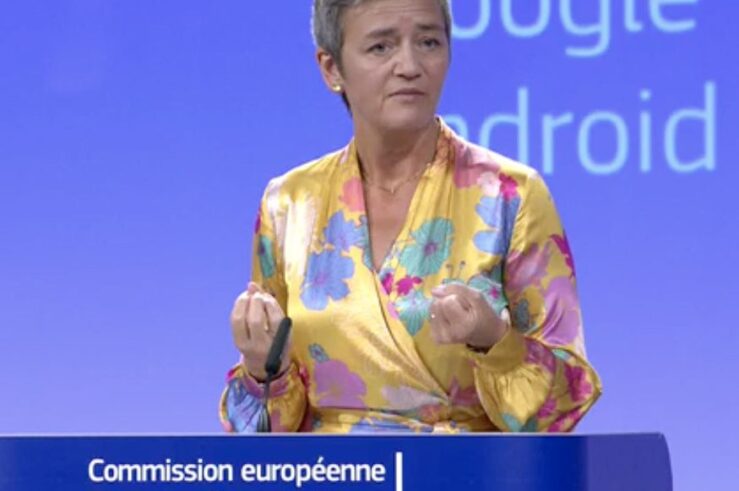Showing results for: “google”
Are the antitrust laws any defense to the real dangers of mega-mergers and big technology power aggregation?
One year ago, Amazon acquired Whole Foods in a $13.7 billion deal. At the time, David Balto, a disciple of current antitrust orthodoxy, wrote: Those who are saying the Amazon-Whole Foods merger is a competition problem are leading us into the jungle without a compass and no clear objective. Antitrust law should stick to protecting consumers and ... Are the antitrust laws any defense to the real dangers of mega-mergers and big technology power aggregation?
The Amazon / Whole Foods overreaction: Antitrust populism exposed
The gist of these arguments is simple. The Amazon / Whole Foods merger would lead to the exclusion of competitors, with Amazon leveraging its swaths of data and pricing below costs. All of this begs a simple question: have these prophecies come to pass? The problem with antitrust populism is not just that it leads to unfounded predictions regarding the negative effects of a given business practice. It also ignores the significant gains which consumers may reap from these practices. The Amazon / Whole foods offers a case in point.
It’s Not Time To Panic About Amazon’s Purchase of Whole Foods. Yet.
Even with these caveats, it’s still worth looking at the recent trends. Whole Foods’s sales since 2015 have been flat, with only low single-digit growth, according to data from Second Measure. This suggests Whole Foods is not yet getting a lift from the relationship. However, the percentage of Whole Foods’ new customers who are Prime Members increased post-merger, from 34 percent in June 2017 to 41 percent in June 2018. This suggests that Amazon’s platform is delivering customers to Whole Foods.
Senator Warner’s retrogressive proposals could lead to arbitrary and capricious interventions that would harm entrepreneurs and consumers
Last week, I objected to Senator Warner relying on the flawed AOL/Time Warner merger conditions as a template for tech regulatory policy, but there is a much deeper problem contained in his proposals. Although he does not explicitly say “big is bad” when discussing competition issues, the thrust of much of what he recommends would ... Senator Warner’s retrogressive proposals could lead to arbitrary and capricious interventions that would harm entrepreneurs and consumers
The European Commission’s Google Android decision takes a mistaken, ahistorical view of the smartphone market
What to make of Wednesday’s decision by the European Commission alleging that Google has engaged in anticompetitive behavior? In this post, I contrast the European Commission’s (EC) approach to competition policy with US antitrust, briefly explore the history of smartphones and then discuss the ruling. Asked about the EC’s decision the day it was announced, ... The European Commission’s Google Android decision takes a mistaken, ahistorical view of the smartphone market
Will the European Commission’s Google Android Decision Benefit Consumers?
By Pinar Akman, Professor of Law, University of Leeds* The European Commission’s decision in Google Android cuts a fine line between punishing a company for its success and punishing a company for falling afoul of the rules of the game. Which side of the line it actually falls on cannot be fully understood until the ... Will the European Commission’s Google Android Decision Benefit Consumers?
The EU’s Google Android antitrust decision falls prey to the nirvana fallacy
Today the European Commission launched its latest salvo against Google, issuing a decision in its three-year antitrust investigation into the company’s agreements for distribution of the Android mobile operating system. The massive fine levied by the Commission will dominate the headlines, but the underlying legal theory and proposed remedies are just as notable — and ... The EU’s Google Android antitrust decision falls prey to the nirvana fallacy
Why the EU’s Google Android Antitrust Fine May Harm R&D and Innovation
Regardless of which standard you want to apply to competition law – consumer welfare, total welfare, hipster, or redneck antitrust – it’s never good when competition/antitrust agencies are undermining innovation. Yet, this is precisely what the European Commission is doing. Today, the agency announced a €4.34 billion fine against Alphabet (Google). It represents more than ... Why the EU’s Google Android Antitrust Fine May Harm R&D and Innovation
Why the Commission’s Google Android decision harms competition and stifles innovation
Our story begins on the morning of January 9, 2007. Few people knew it at the time, but the world of wireless communications was about to change forever. Steve Jobs walked on stage wearing his usual turtleneck, and proceeded to reveal the iPhone. The rest, as they say, is history. The iPhone moved the wireless ... Why the Commission’s Google Android decision harms competition and stifles innovation
Weekend reads: Big is bad edition
Big is bad, part 1: Kafka, Coase, and Brandeis walk into a bar … There’s a quip in a well-known textbook that Nobel laureate Ronald Coase said he’d grown weary of antitrust because when prices went up, the judges said it was monopoly; when the prices went down, they said it was predatory pricing; and ... Weekend reads: Big is bad edition
Will the European Commission Reduce the Incentive to Innovate?
The EC’s Android decision is expected sometime in the next couple of weeks. Current speculation is that the EC may issue a fine exceeding last year’s huge 2.4B EU fine for Google’s alleged antitrust violations related to the display of general search results. Based on the statement of objections (“SO”), I expect the Android decision ... Will the European Commission Reduce the Incentive to Innovate?
The International Competition Network at Seventeen
Introduction Last week I attended the 17th Annual Conference of the International Competition Network (ICN) held in New Delhi, India from March 21-23. The Delhi Conference highlighted the key role of the ICN in promoting global convergence toward “best practices” in substantive and procedural antitrust analysis by national antitrust (“competition”) agencies. The ICN operates as ... The International Competition Network at Seventeen






